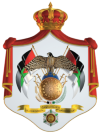Strategic Plan
- +
- -
The General Budget Department released its strategic plan for the years 2010-2013. It includes the priorities and themes for the next stage aimed at translating the Department’s vision that states: "A transparent general budget that strengthens the milestones of sustainable development, and top the list of global good practices”. In addition to achieving its mission, which reads: “An optimal allocation of available financial resources, in accordance with advanced methodologies that enable government ministries, departments, and units to realize national objectives and priorities, exceeding the expectations of service recipients.”
The national objectives, royal initiatives, and governmental plans and programs were taken into account when preparing the strategic plan of the Department for 2010-2013. This plan is an extension of the Department’s strategic plan for 2008-2011. Upon the formulation of its vision, mission, and strategic objectives, the Department also relied on a set of core values represented in learning, transparency, cooperation, impartiality, and responsibility.
The General Budget Department seeks in its strategic plan to actively participate in achieving the national ojectives through contributing to the development of the Jordanian economy to be prosperous and open to regional and global markets; contributing to restructuring the public sector to be more productive and effective; and contributing to strengthening public management to be financially stable, transparent, and accountable.
The plan included a number of strategic objectives that the Department seeks to achieve: contribute to building a sound and stable financial position in the Kingdom; keep up with the best modern international practices in budget management; and strengthen institutional capacity in the Department. Moreover, the plan included a number of sub-objectives, some of the most important are: public spending control and guidance in line with the national priorities, gradual reduction of support provided for government units, maintaining a safe level of budget deficit as a percentage of GDP, and commitment to the public debt ceiling as a percentage of GDP.
Furthermore, sub-objectives included: deepen the implementation of the Results–Oriented Budgeting, strengthen and develop the general budget and governmental units’ budgets preparation within the medium-term framework, expand the implementation of COA segments of the general budget and governmental units’ budgets, contribute to building the Government Financial Information Management System (GFMIS), pay more attention to the analytical analysis of public expenditure, and measure the level of achievement in capital projects of government ministries, departments, and units on the level of the Kingdom’s governorates to promote the approach of decentralization.
The plan also included other sub-objectives aimed at increasing the efficiency of human resources, improving internal work environment, and transferring knowledge to government ministries, departments, and units in order to implement modern concepts of the budget.
The strategic plan of the General Budget Department was prepared and developed by the contribution of all sectors and directorates in the Department, in addition to the senior management headed by the Director-General.
-
Royal Decree
Royal decree approves Manpower Tables By-law of Government Ministries and Departments for Fiscal Year 2010.
30/12/2010 -
Budget Speech
Abu Hammour delivers General Budget Draft Law Speech for 2011 in Lower House
29/12/2010 -
The Lower House
Lower House forwards General Budget Draft Law for 2011 to Financial and Economic Committee
20/12/2010 -
Cabinet endorses
Cabinet approves Manpower Tables of Government Units for Fiscal Year 2010
14/12/2010 -
Global Report
Global Report: Jordan Tops Arab Region on Budget Transparency, Accountability
01/12/2010 -
Strategic Plan
General Budget Department Releases Its Strategic Plan for 2010-2013
29/11/2010 -
Workshop
The General Budget Department holds a workshop on how to review the programs included in Government Ministries and Departments’ budgets to realize their objectives
06/10/2010 -
Circular issued
General Budget Draft Preparation Circular for 2011 Issued
05/10/2010 -
Cabinet Approves
The Cabinet approves a Provisional Law supplementary to the General budget law for the fiscal year 2010 of 350 million JDs
05/10/2010 -
Workshop
GBD holds workshop on (Citizen’s Guide) in cooperation with the USAID
15/07/2010 -
GFMIS Course
A Training Course for the GFMIS End-users in the GBD
07/05/2010 -
Director General
Director General of General Budget Department talks to Addustour Newspaper
27/04/2010 -
Workshop
General Budget Department holds a workshop on the revision of the strategic Objectives and Performance Measurement Indicators in cooperation with the (USAID)
22/04/2010 -
Minister of Finance visits GBD
Minister of Finance visits the General Budget Department
22/04/2010 -
Minister of Finance
In a speech delivered on behalf of His Excellency the Minister of Finance at the event of launching the gender-responsive draft budget HE Dr. Zaghloul
04/04/2010
News by year
Latest news
-
Circular to implement the Budget
The issuance of a circular to implement the Budget Law No. (1) for the year 2026
06/01/2026 -
The Financial Order
The Financial Order for the year 2026 issued
05/01/2026 -
Official Circular Issued
The Budget Circular No.(14) of the year 2025 issued
30/10/2025 -
The Meeting of His Excellency
The Meeting of His Excellency on Almamlaka TV
01/07/2025 -
Prime Minister instructs
The issuance of the circular of his excellency the Prime Minister to prepare the Draft General Budget Law of the fiscal year 2026
03/06/2025
